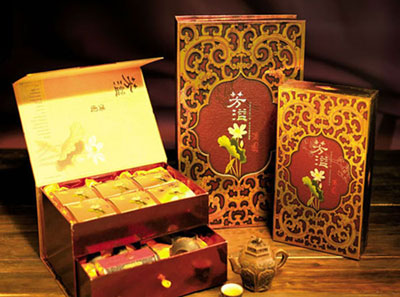By Becky Li
China.org.cn staff reporter
The day of the traditional Chinese Mid-Autumn Festival, also called the Moon Festival, falls on the fifteenth day of the eighth month in the Chinese lunar calendar, and usually in late September or in early October according to the Gregorian calendar. This year, the festival falls on October 3.
As the day draws near, mooncakes become the most popular food and a gift given to mark the occasion. With the range of mooncakes changing constantly, a new variety, packaged in wooden, bamboo, and silk boxes, has been prevailing on the market. These luxuriantly packaged mooncakes are selling well both in supermarkets and hotels around the country.

Some producers obviously believe that people will be more likely to purchase their mooncakes if the packaging is extremely attractive, and they even add "gifts" inside such as bottles of wine or a small golden figure of Buddha.
Most of the luxury boxes are thrown away after the mooncakes have been eaten. I remember during my childhood, mooncakes came only in paper cartons with beautiful designs printed on them. It seems that Chinese people now have a tendency to pursue luxury after the "problem of adequate food and clothing" has been settled. What a waste!
It is a Chinese tradition to visit others with presents, usually food, during festivals. People usually choose those with good-looking packages for the sake of "face", no matter the true value of the food itself. However, tradition should not become an excuse for waste in a timber-deficient nation like China.
Some Chinese experts estimate that 10 million wooden mooncake boxes require the felling of over 100 trees, each with a diameter of at least 10 centimeters. In a sense, Chinese consumers are not only eating mooncakes; they are devouring a lot of trees, too!
China is not particularly rich in woodland resources. Only 16.55 percent of its territory is covered by forests, ranking 111th in the world. This cannot possibly satisfy the needs of 1.3 billion people accounting for more than 20 percent of the world's total population.
Currently a "green packaging" drive has been prevailing around the world. Germany has introduced a "Law of Recycling Economy". Denmark has been the lead in implementing the system of "green tax". Over-packaging is illegal in South Korea. Many countries demand manufacturers, importers and retailers to take the responsibilities for recycling and remanufacturing of package materials. These practices deserve some consideration in China.
Every year before the Mid-Autumn Festival, I receive a few boxes of mooncakes as presents from my friends and relatives and most of these gifts are in the most luxuriant packaging. However, I seldom eat these mooncakes, but, instead, give them to other friends and relatives. To treat myself and my daughter, I buy non-packaged cakes, which are much cheaper than their luxury equivalents. They also taste very delicious. Sometimes I buy mooncakes after the festival because they are then more than 50 percent cheaper!
(November 9, 2009)